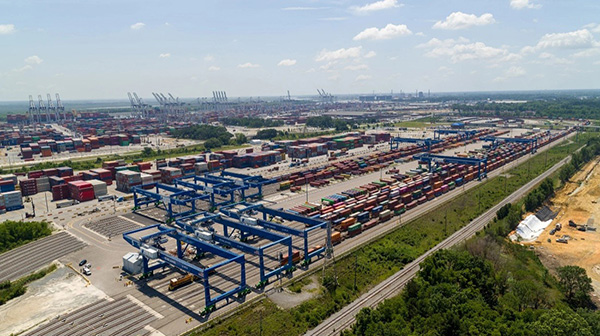Volume 27 | Issue 2
Click here to read the complete illustrated article or continue below to read the text article.
Here in Georgia, food processing contributes more than $11 billion each year to our $661 billion gross domestic product (GDP) making it a top 10 U.S. state for food processing.
Almost half of the country’s top 100 food processing companies have operations in Georgia, and with the eighth-largest refrigerated capacity space in the U.S., the industry is positioned for continued growth. In terms of crops, the state leads the nation in the production of peanuts, eggs, and broilers, with blueberries rising as a prominent Georgia export. Many food processing companies located in Georgia – including Pilgrim’s Pride, Chick-fil-A, Coca-Cola, and Tyson Foods – source their products directly from Georgia farms and operations.
Global food and beverage giants are continuing to choose Georgia – in 2023, Yakult, a Japanese probiotic beverage company, announced it had selected Georgia for its $305 million, production facility; CJ Foodville USA, the Korean company behind bakery chain Tous les Jours, announced a $47 million bakery and food processing plant; and Walmart announced a new dairy processing facility, creating 400 new jobs and over $350 million in investment.
How do we make it happen? It’s a comprehensive strategy that encompasses workforce initiatives, tech innovation, business resources, advanced storage capabilities, and accessibility.
Food, fiber production, and related agriculture industries support more than 320,000 jobs in Georgia. Educational offerings include degree pathways from 22 technical colleges on 88 campuses, in addition to top-ranked programs and research in food safety and processing.
Georgia Quick Start, the No. 1 workforce development program in the country, has updated the skill sets of more than 1 million employees in numerous industries, including food processing. The program has been utilized by Premium Peanut and King’s Hawaiian, both of which qualified for customized job training, including courses for automated control systems.
Georgia is home to several universities at the forefront of automating processes for alleviating workforce shortages, reducing waste, and cutting costs. This includes variable rate irrigation, integrated precision agriculture, Controlled- Environment Agriculture (CEA), food product innovation, and food system technology integration.
The Georgia Artificial Intelligence Manufacturing (GA-AIM) Technology Corridor, a statewide initiative led by Georgia Tech, was recently awarded $65 million to accelerate the development of AI technology and workforce training.
The Center for Food Safety at the University of Georgia (UGA) works closely with the Atlantaheadquartered Centers for Disease Control (CDC) to develop techniques to detect, control, and eliminate disease-causing microorganisms and toxins.
The Peach State isn’t known for producing leafy greens, tomatoes, and other fresh vegetables year-round, but with new (CEA) technology in the form of greenhouses and indoor warehouse operations, this is now a reality. Georgia is home to many CEA companies such as Pure Flavor, Kalera, Local Bounti, and Better Fresh Farms. Local Bounti’s Georgia facility uses 24 acres of growing area, which requires 90 percent less land and water than traditional farming.
Unique to the state, the Georgia Center of Innovation (the Center) connects state businesses with appropriate resources, including expert staff members, external partners, and independent mentors, to help them overcome challenges and embrace opportunities within the food processing industry.
Take Pete’s Produce company for example – the support it received from the Center began in 2017 and eventually led to the establishment of a new hydroponic agriculture facility in Peach County. Based on the company’s success, in 2021, an $18 million capital investment provided consumers with a range of sustainable packed salad varieties and greens. Its success caught the attention of Local Bounti Corporation, a publicly traded indoor agriculture company. Bounti acquired Pete’s in March 2022 to advance its indoor growing technologies and bring fresh and sustainable greens to underserved communities throughout the state.
Sweet Grass Dairy, which produces a wide range of high-quality, cow’s milk cheese products, went from selling locally in Thomasville to establishing an acclaimed cheese factory with more than 50 employees and distribution to 40 states. It was in part thanks to the Center’s resources that helped the company identify the appropriate product shelf life, which allowed for additional time for safe travel and storage to other markets.

Georgia is leading the way in temperature-controlled and frozen storage capabilities, with over 67 cold chain storage facilities and 189 million cubic square feet of space. Over 85% of the world’s third-party logistics providers operate in Georgia, 80% of global public refrigerated warehousing companies have locations in Georgia, and 40% of global public refrigerated warehousing companies have headquarters in Georgia.
Savannah has the largest concentration of import distribution centers on the East Coast. The Port of Savannah has more refrigerated container capacity than any East or Gulf Coast terminal, with over 2,800 reefer rack slots currently and plans to expand the cold cargo capacity at the Garden City Terminal to more than 3,500 slots.
With 1,200 miles of interstate highways, including I-75, I-85, I-95 and I-20, and an additional 20,000 miles of federal and state highways, businesses can easily transport products in and out of the Southeast. This strategic domestic market is projected to expand from 80 million people to over 98 million by 2030, which is equivalent to 27 percent of the U.S. population.
For companies importing or exporting globally, the Port of Savannah, single largest and fastest- growing container terminal in America, is connected to the rest of the state by two on-terminal Class I railroads (Norfolk Southern and CSX). With 5,000 miles of railroads, Georgia has the most extensive rail system and largest intermodal hub in the Southeast region of the United States.
By leveraging our robust education system and proactive industry strategies, we are creating a resilient and competitive food processing sector that promises to drive economic prosperity and ensure food security in the future.
What makes Georgia different is our proactive and proven approach put in place to alleviate potential gaps in the future – including on-site training and aligned education between university, technical college systems, K-12 grades and through the Department of Education’s Career, Technical, and Agriculture curriculum.
Looking ahead, Georgia’s food processing industry is poised for a dynamic future marked by innovation, sustainability, and growth. With a commitment to advancing technology, fostering R&D, and enhancing workforce skills, Georgia is well-equipped to meet the evolving demands of the global food market. As we continue to invest in these key areas, Georgia will remain a leader in the food processing industry, paving the way for a brighter, more sustainable future.

About the Author:
Kristi Brigman is the Deputy Commissioner of Global Commerce at the Georgia Department of Economic Development, where she leads the team responsible for attracting job and investment growth to the State of Georgia. Her recruitment successes at GDEcD include Visa’s office hub expansion in Midtown Atlanta, Cisco’s Talent and Collaboration Center, Papa Johns’ Global Headquarters, and Hapag-Lloyd’s North American headquarters.
Tune in for a timely conversation with Susan Spence, MBA, the new Chair of the ISM Manufacturing Business Survey Committee. With decades of global sourcing leadership—from United Technologies to managing $25B in procurement at FedEx—Susan shares insights on the key trends shaping global supply chains and what they mean for the manufacturing outlook.